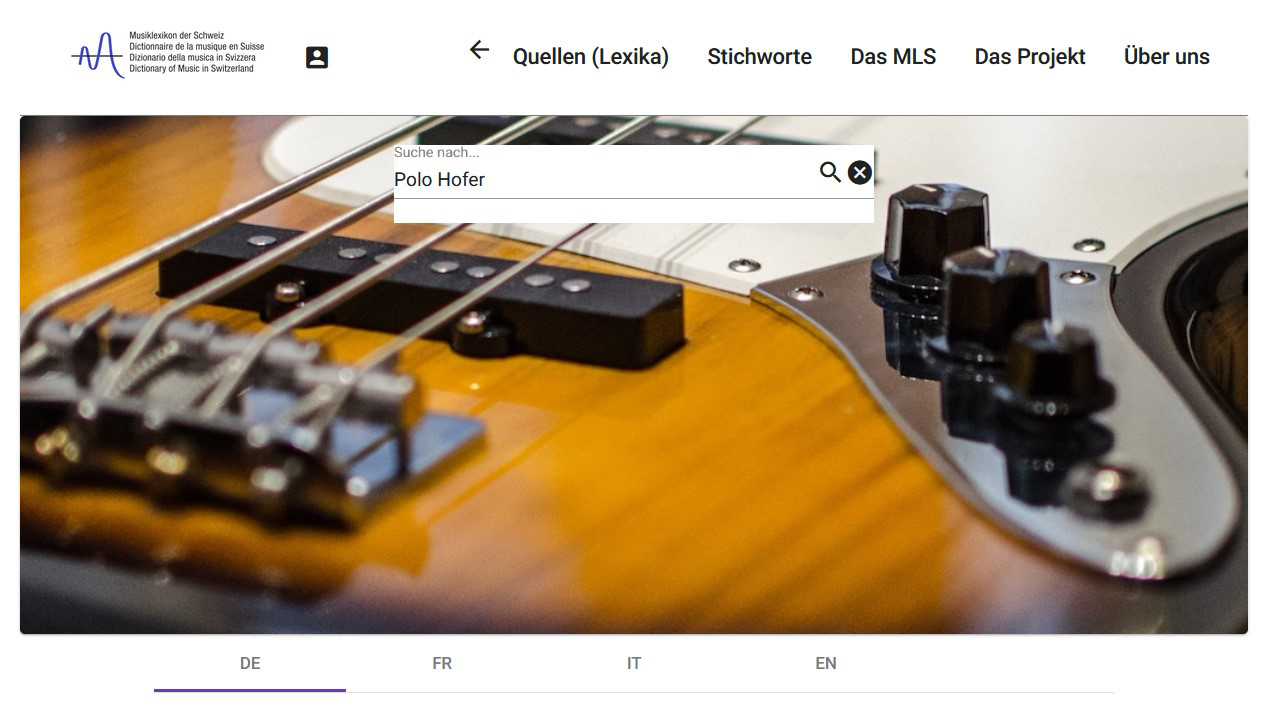Long breath for the Swiss music lexicon
A conference in Bern highlighted the media upheavals that the "Musiklexikon der Schweiz" (MLS) has to cope with. Interested parties are invited to help write new entries as part of a participatory project.

In contrast to other European countries, Switzerland does not have a modern reference work on music history. The existing encyclopaedias are outdated and do not do justice to the diversity and richness of Switzerland's musical life, writes the Swiss Music Research Society (SMG) on its website. A new, scientifically based music encyclopedia has been demanded for decades.
Work is underway on the planned and now realized first fragments of the Music lexicon of Switzerland (MLS) At the University of Bern, a keyword list has been compiled for the MLS from the existing reference works. Around 11,000 older encyclopaedia articles on 6,800 people have been digitized and processed in a database. However, writing new, original articles is now a far greater challenge than the founding team might have imagined, as the world of encyclopaedias has undergone fundamental changes in recent years. Instead of books, they can now be found on the Internet.
Multimedia, modifiable, multilingual
The media revolution has also completely changed text editing. Encyclopedia articles are no longer erratic texts that may be corrected or supplemented for second or third editions after a few years, but in extreme cases liquid structures with integrated audio, video and image material that editors, external volunteers and other participants are constantly working on. In addition to the actual articles, for example, the history of their changes must now also be documented. Last but not least, Internet, database and multimedia specialists have to be integrated into the team. In addition, a revolution is currently taking place in terms of multilingualism: Lexicon users are increasingly turning to automatic translation aids in order to read texts in their native language. This has far-reaching consequences for the language design of a reference work, especially when, as with the MLS, a multilingual lexicon is created.
The MLS, whose funding is by no means secure, is therefore facing many challenges: On the one hand, its exponents currently have to constantly redefine what it should look like - in the knowledge that digital lexicons and their uses could be completely different again in a few years' time. On the other hand, it is necessary to organize all those who will be working on this major work in a way that academic institutions in Switzerland have little experience with. A professional, full-time editorial team, as was common decades ago for such mammoth editorial projects, is no longer sufficient. Nowadays, such projects also involve countless freelance authors who are familiar with specialist subject areas or geographical regions, and moderation is required for ongoing commentaries on articles.
Databases and citizen science projects
To take the project a step further, the MLS Board of Trustees, in collaboration with the Swiss Academy of Humanities and Social Sciences (SAHS) and the SMG, organized a colloquium (November 23 and 24, 2023) and a workshop (November 25, 2023) for interested authors at the University of Bern.
What the upheavals in the media world mean for the updating of traditional encyclopaedias was shown, for example, in a report on the retro-digitization of the Theater lexicon of Switzerland (tls.theaterwissenschaft.ch). However, the colloquium was also amazed at how diverse the landscape of digital encyclopaedias has become. For example, the competence network Memoriav for the preservation of the audiovisual cultural heritage of Switzerland, a Dictionnaire du Jura or the Western Switzerland project notreHistoire.ch, a historically oriented platform on which the French-speaking part of Switzerland can exchange views and documents on the past and which has corresponding offshoots in the other parts of the country (ourhistory.ch, lanostrastoria.ch, nossaistorgia.ch). There is also a "Musicians' Index", a list of names of musical personalities active in Switzerland in the 19th century. This index is one of several Databases of the Institute of Interpretation at the Bern University of the Arts. Wikipedia cultural ambassador Diego Hättenschwiler rounded off the conference with insights into the work of the global online encyclopedia.
Free contributors and lots of money are needed
Translator and musicologist Irène Minder-Jeanneret, the initiator of the MLS, pointed out that the ten-year project is expected to cost around CHF 9 million. The biggest challenge is likely to be the search for freelance contributors and their cooperation with the MLS editorial team. Assuming that a comprehensive Swiss music lexicon would have to contain perhaps 10,000 new articles, a cultural participation project of this kind is an extremely ambitious undertaking.
On the other hand, cultural participation has been a focus of Swiss cultural policy since 2016. As part of a "Citizen Science" initiative by the Swiss Academies of Arts and Sciences, the MLS team has also launched a participatory project. Groups and individuals are encouraged to document local music cultures for the MLS using words, images and sounds. In the workshop following the conference, a relatively small group of interested people were instructed on how texts should be pre-written so that they are suitable for the lexicon.
Link to the Citizen Science project:
schweizforscht.ch/projects/music-encyclopedia-of-switzerland-1153








